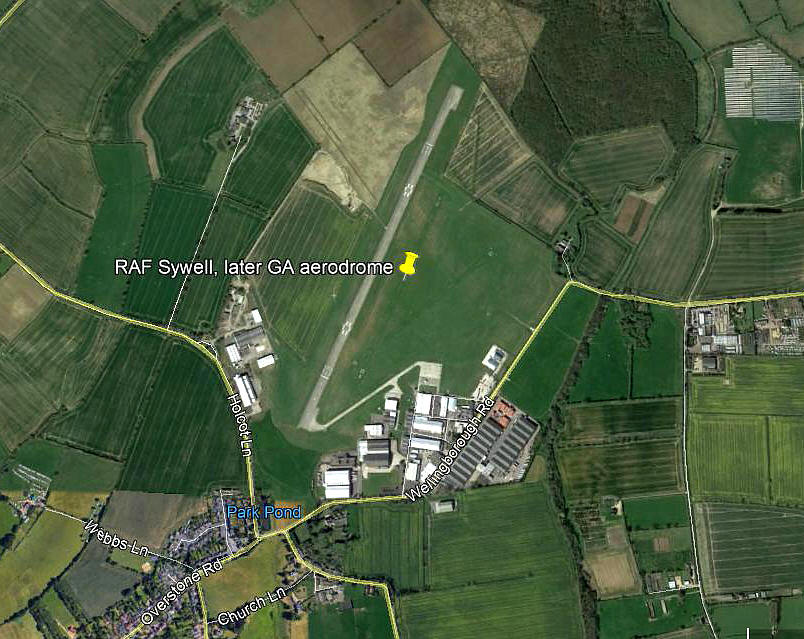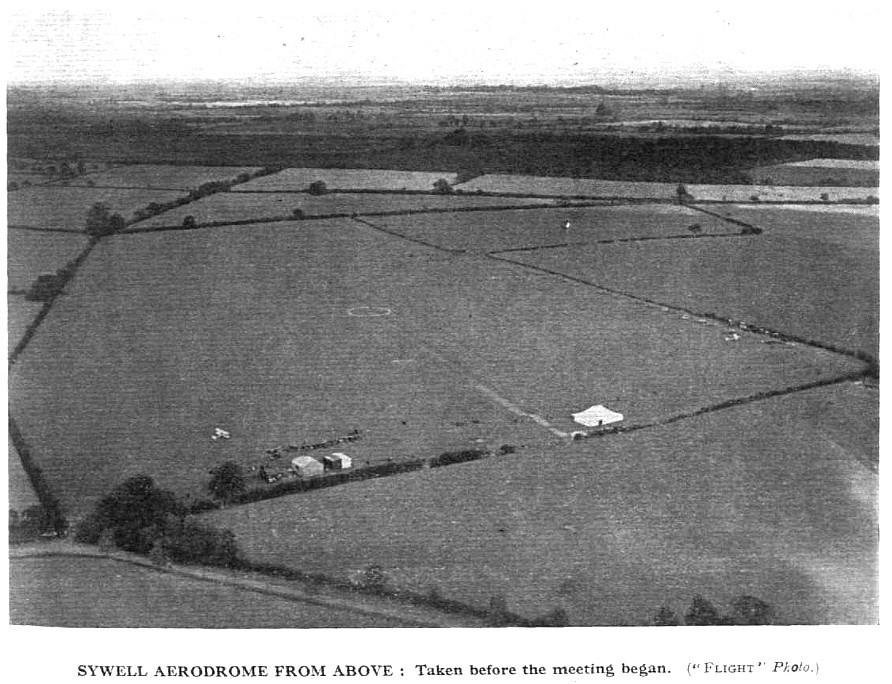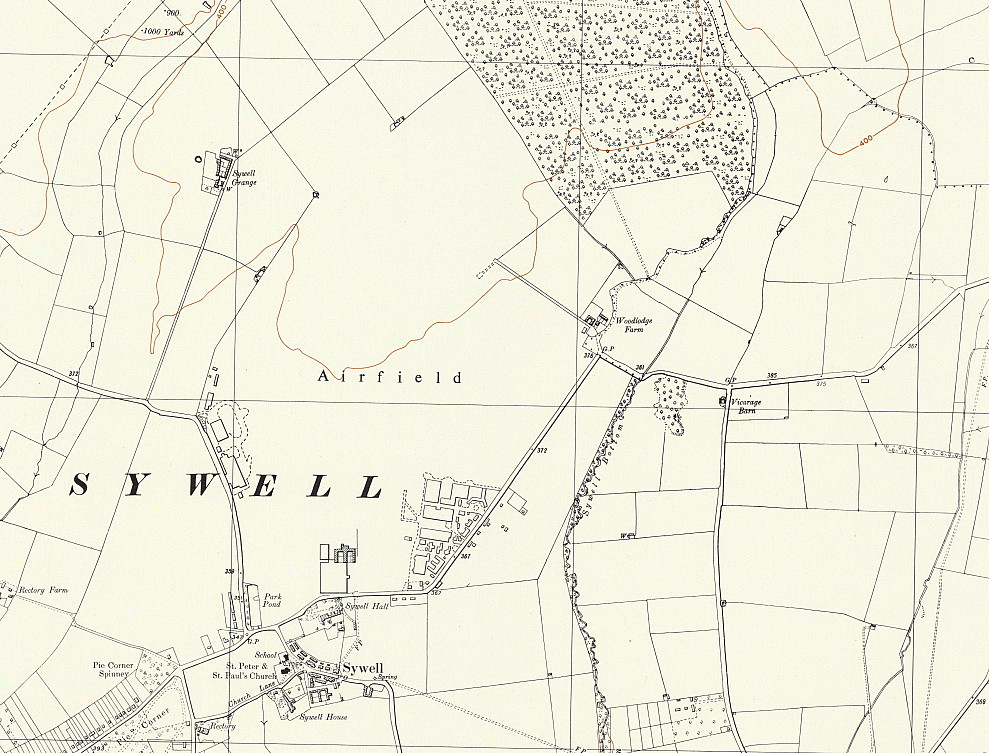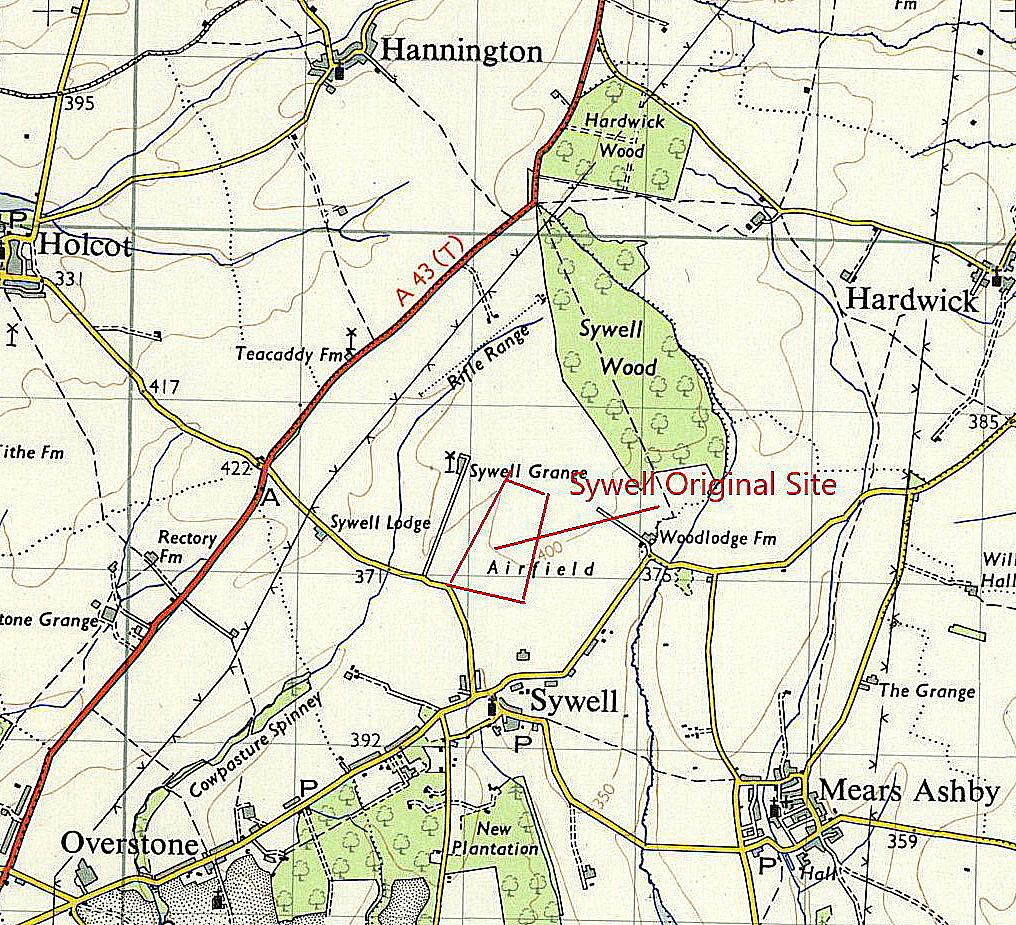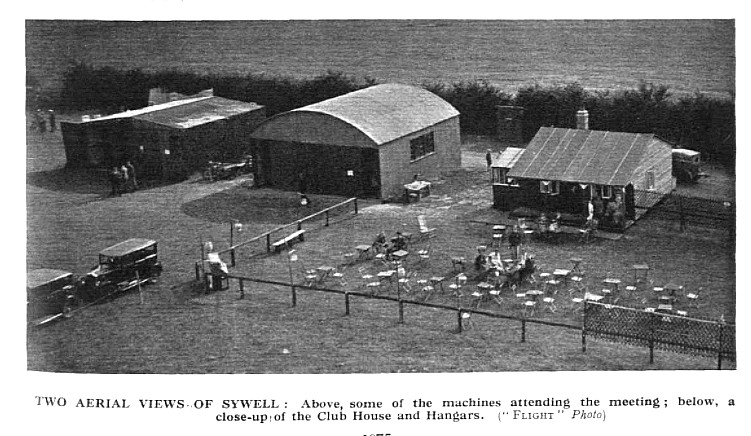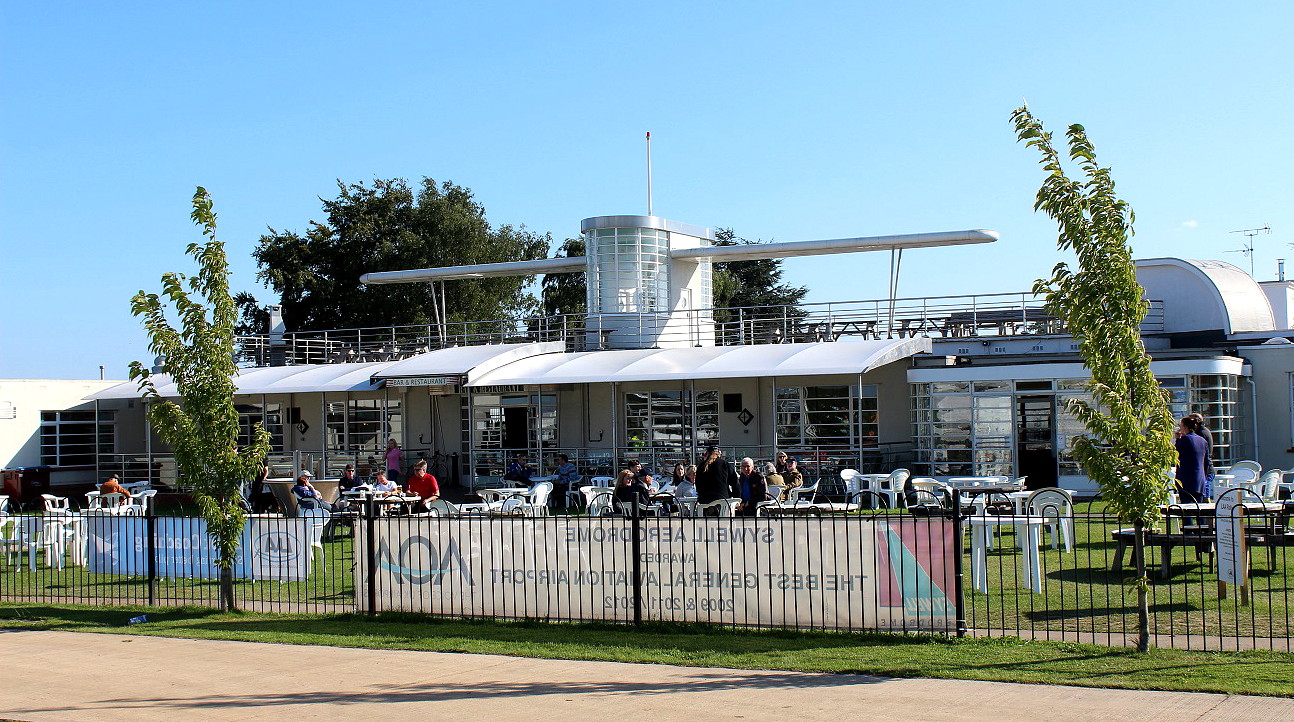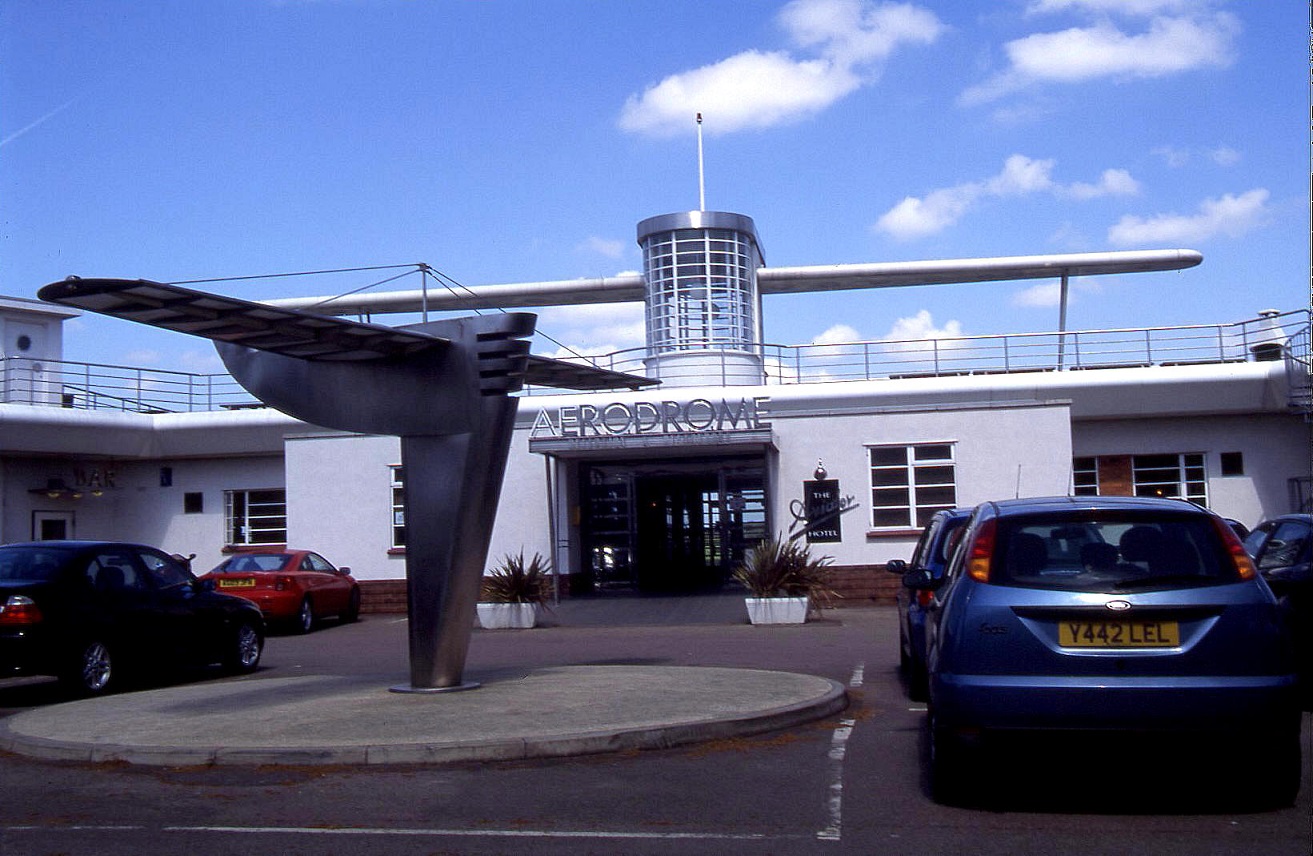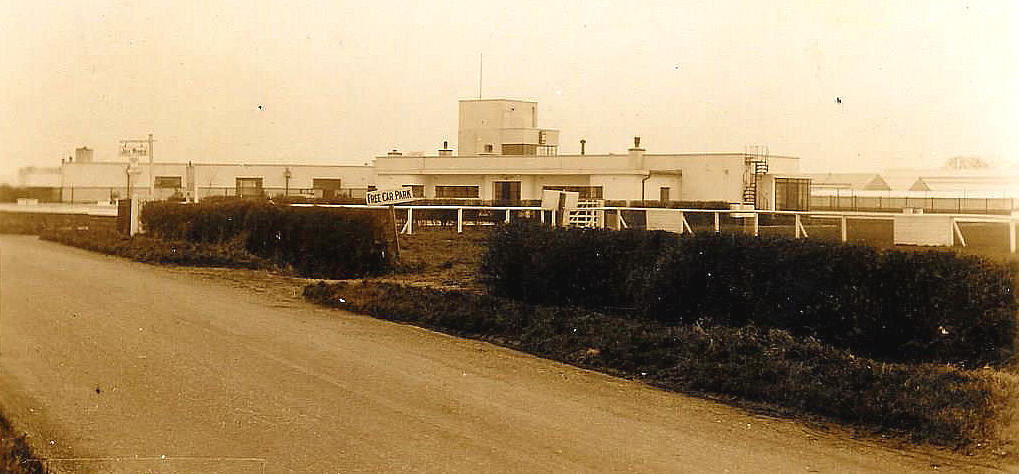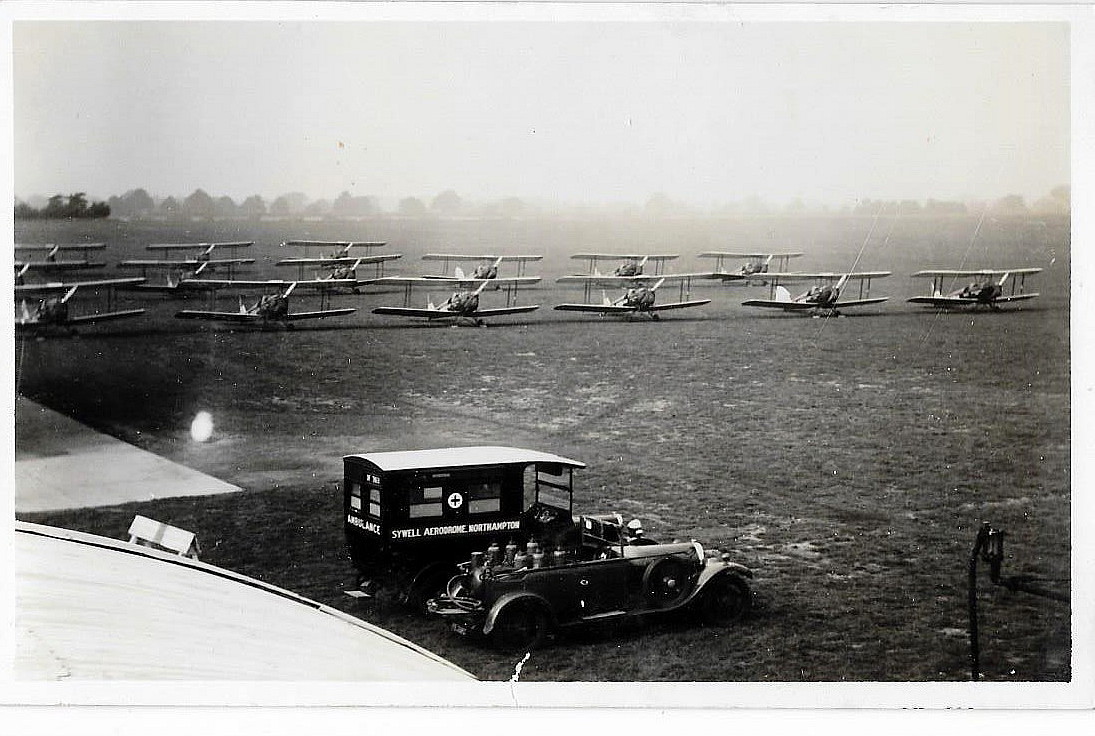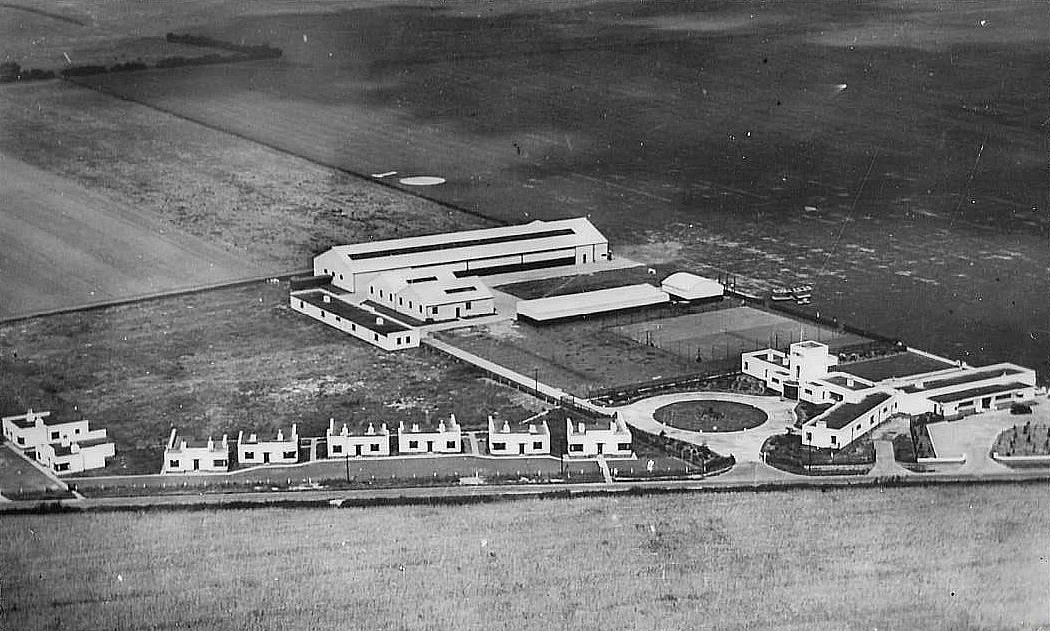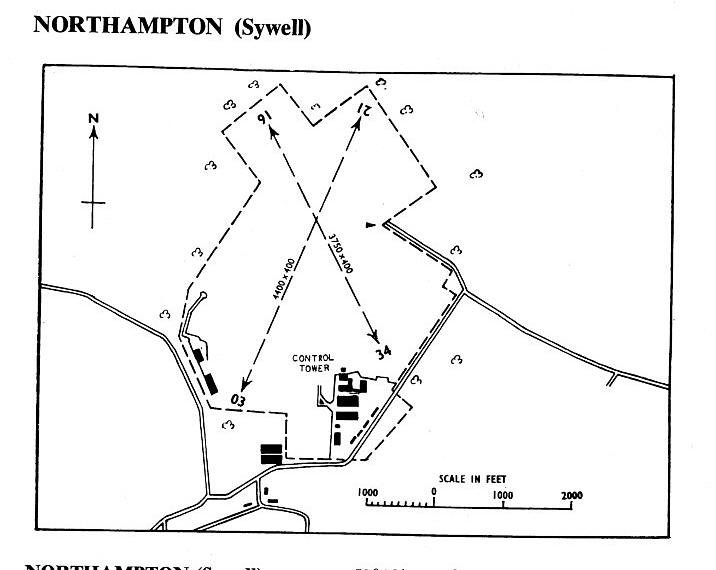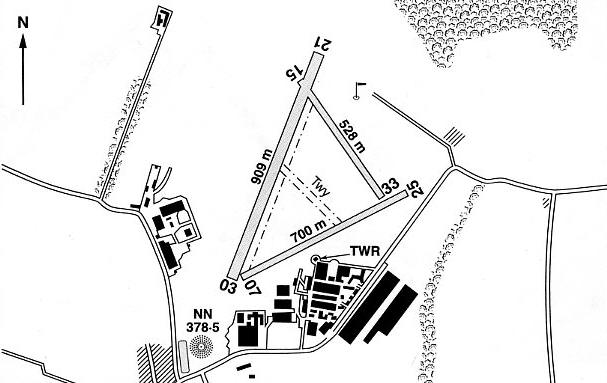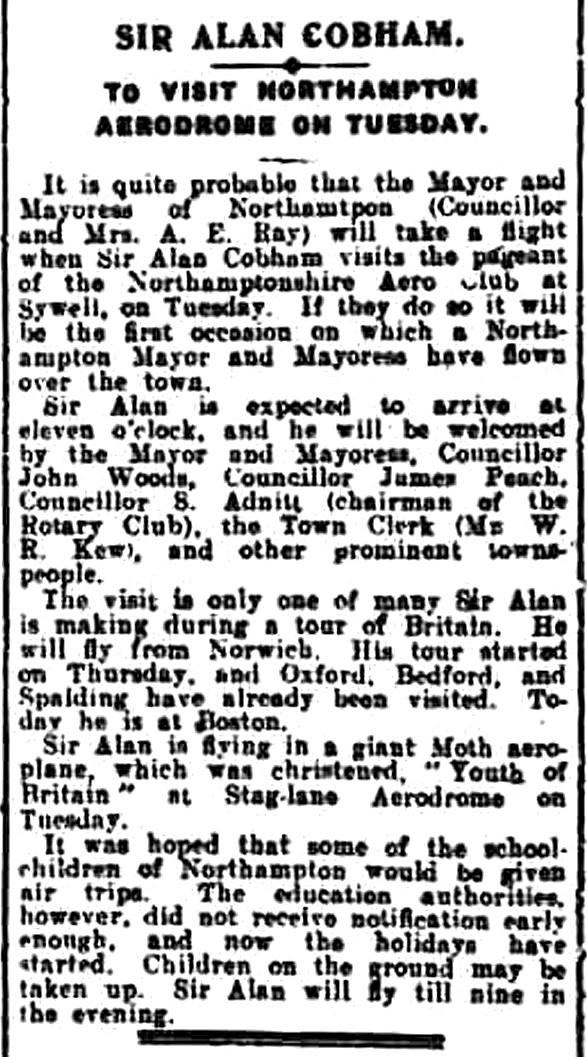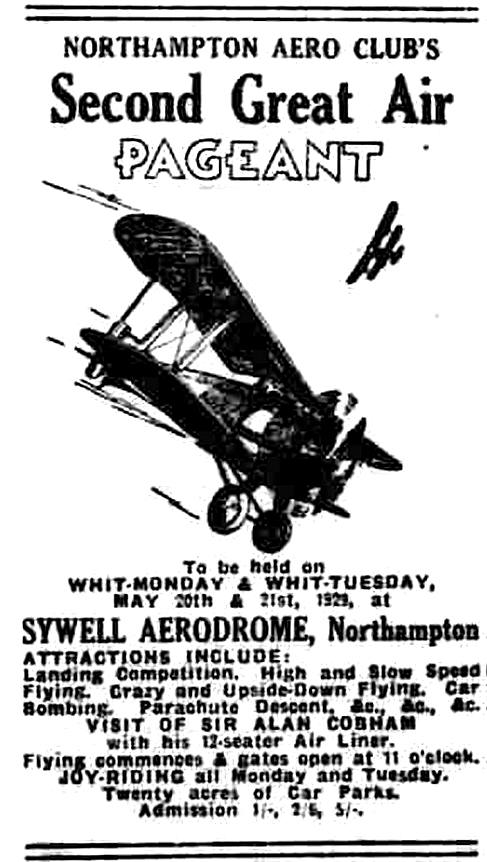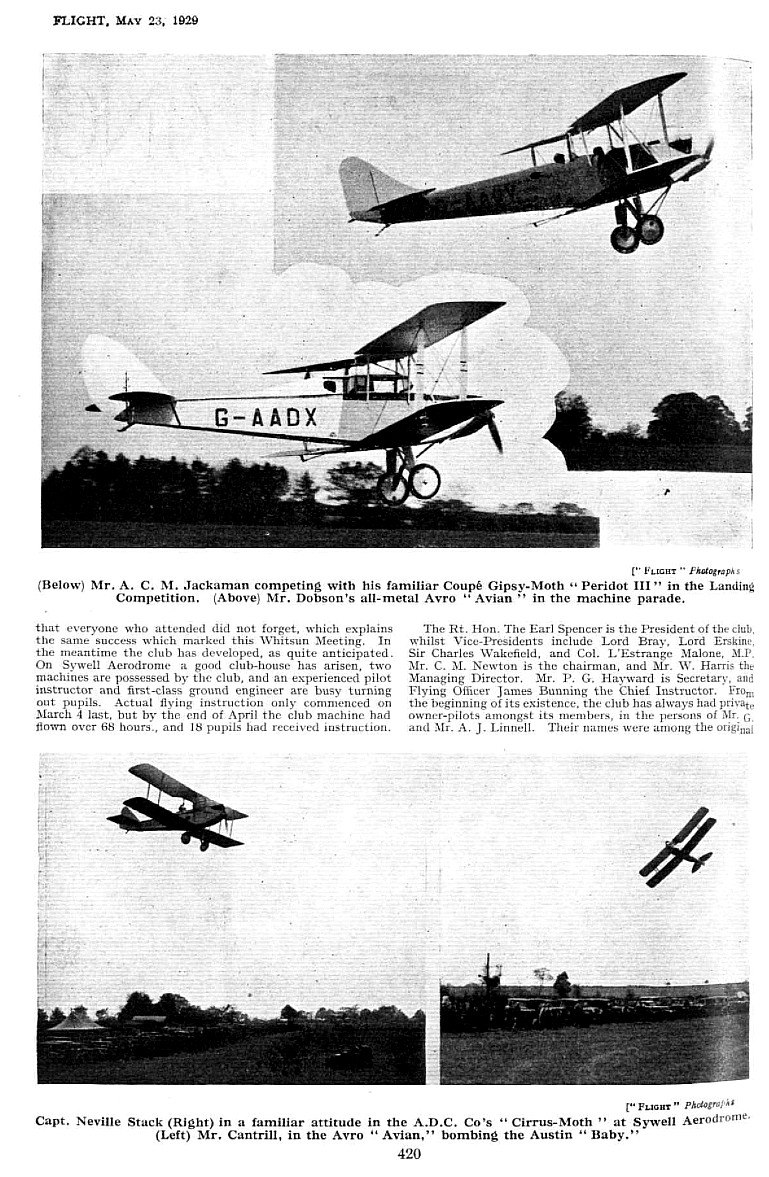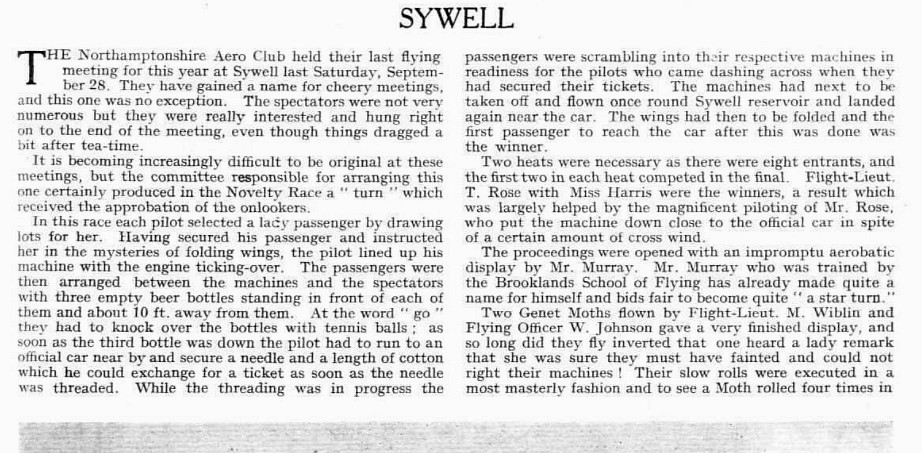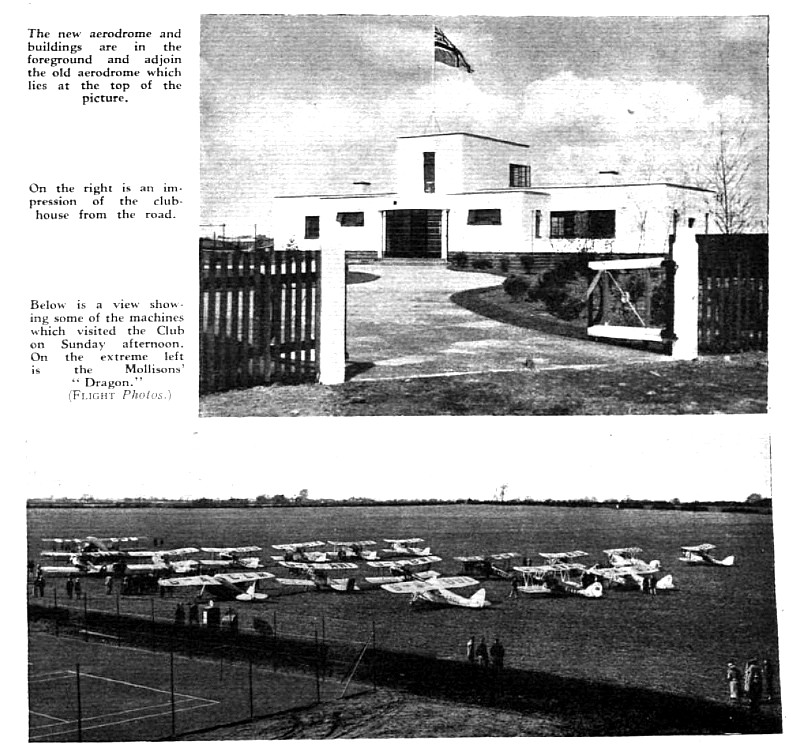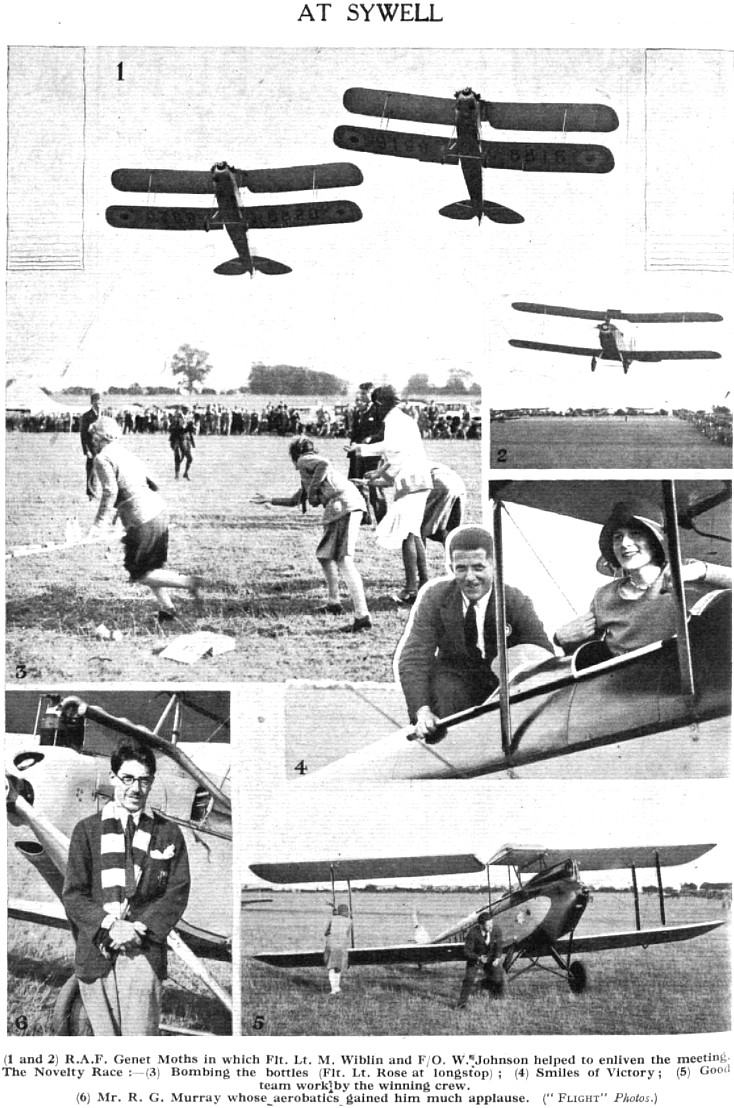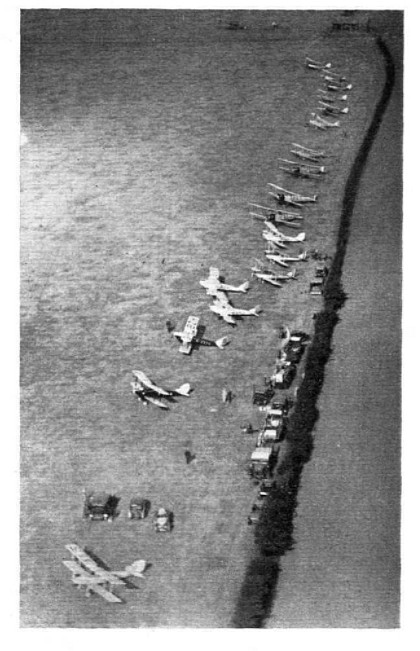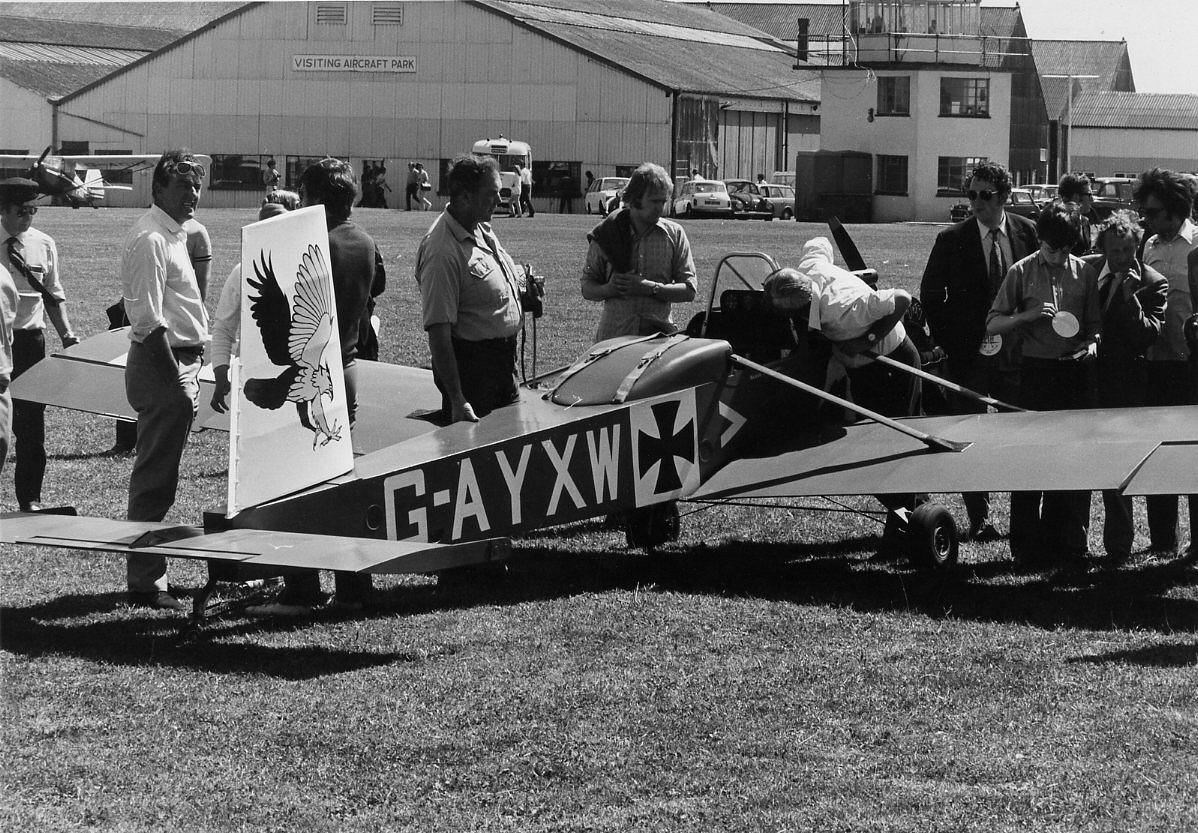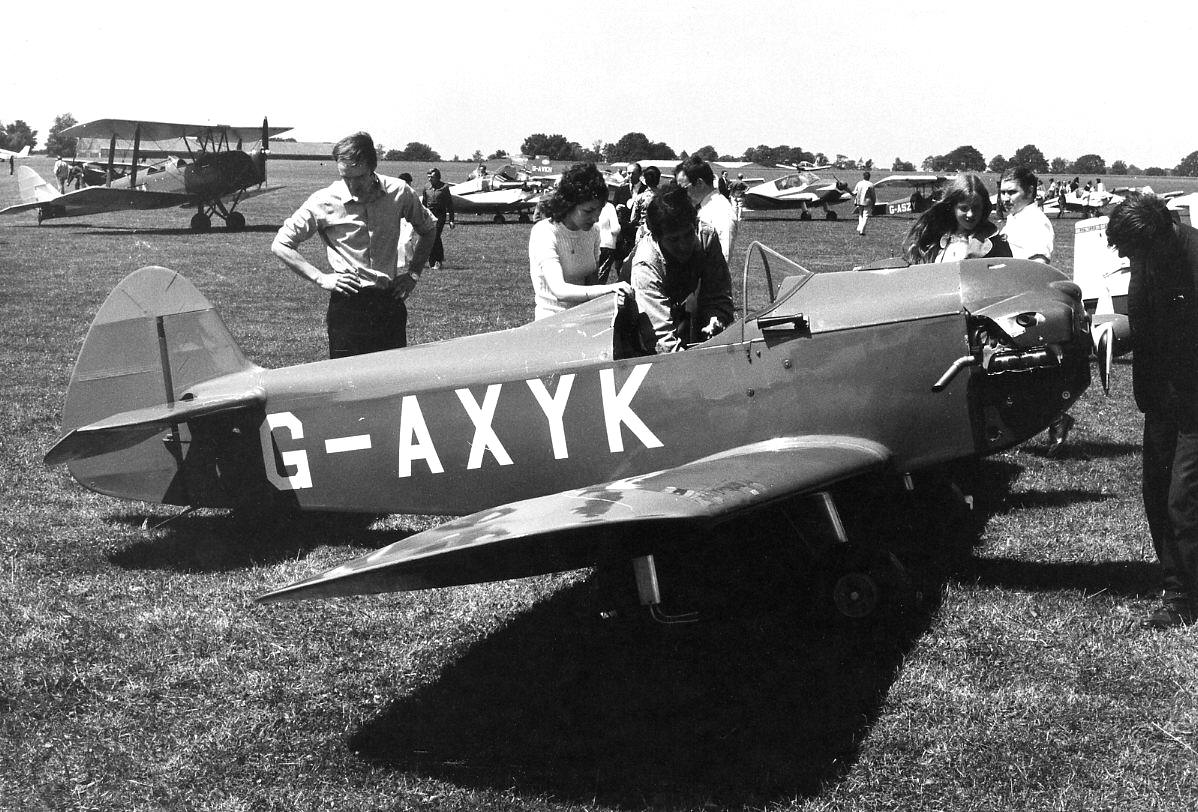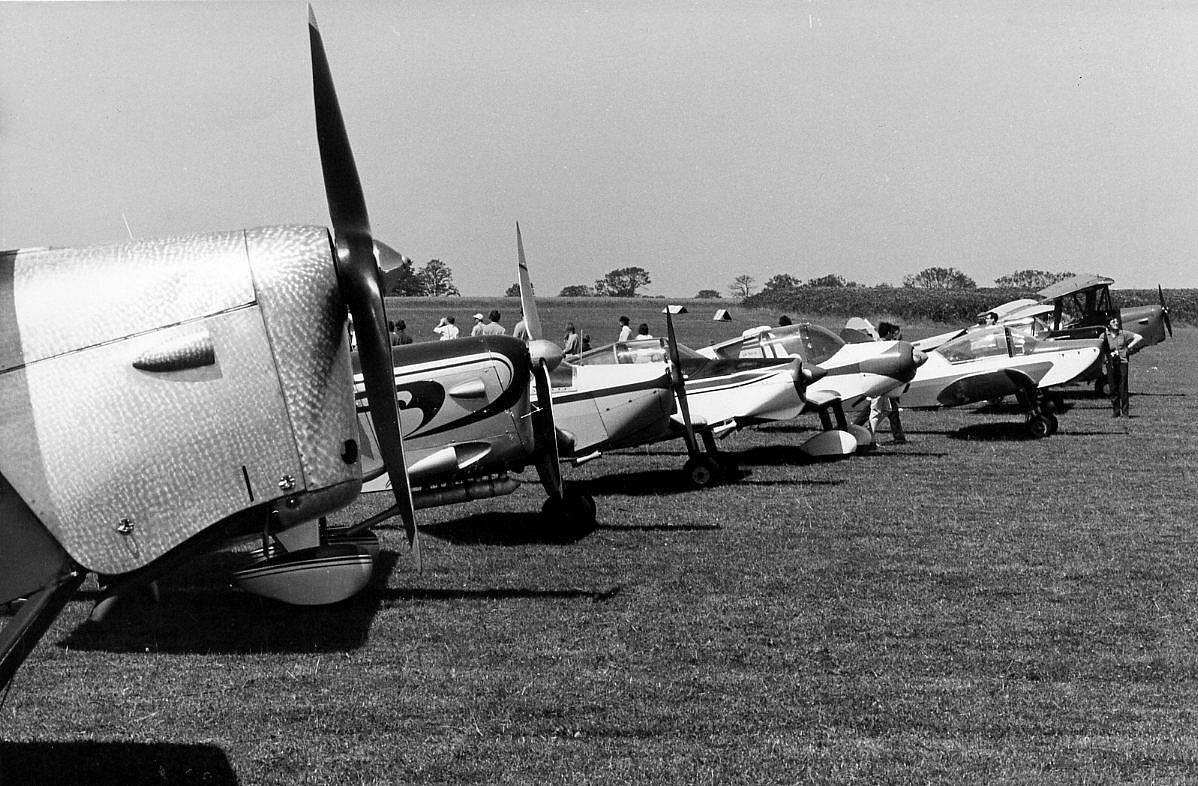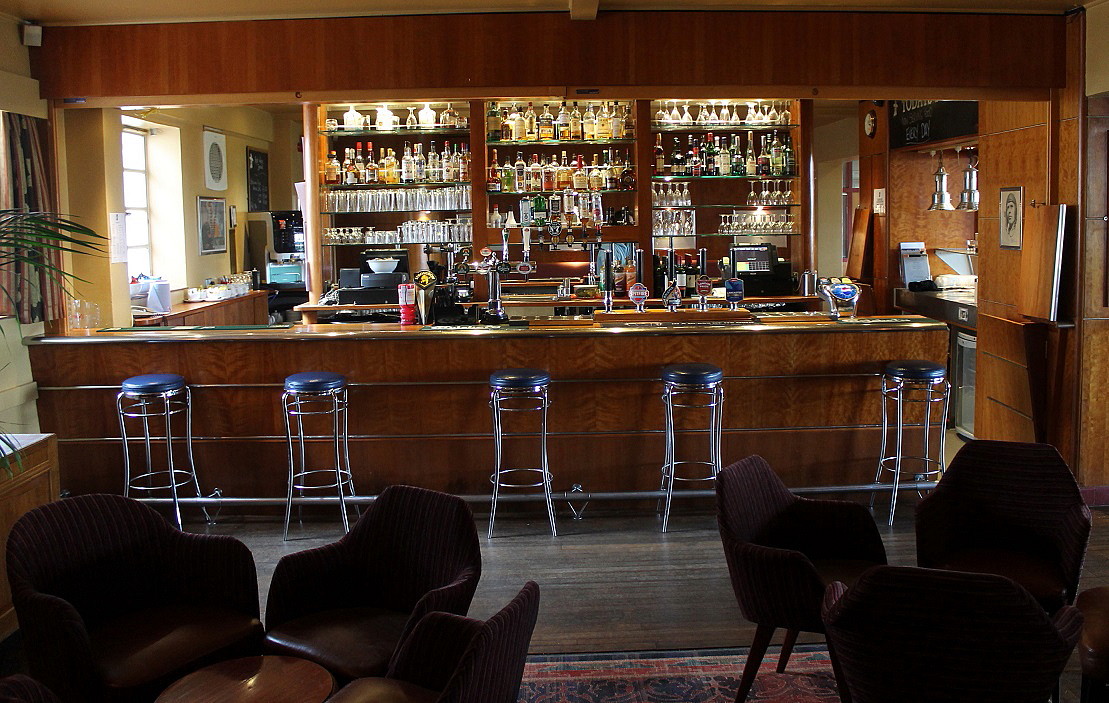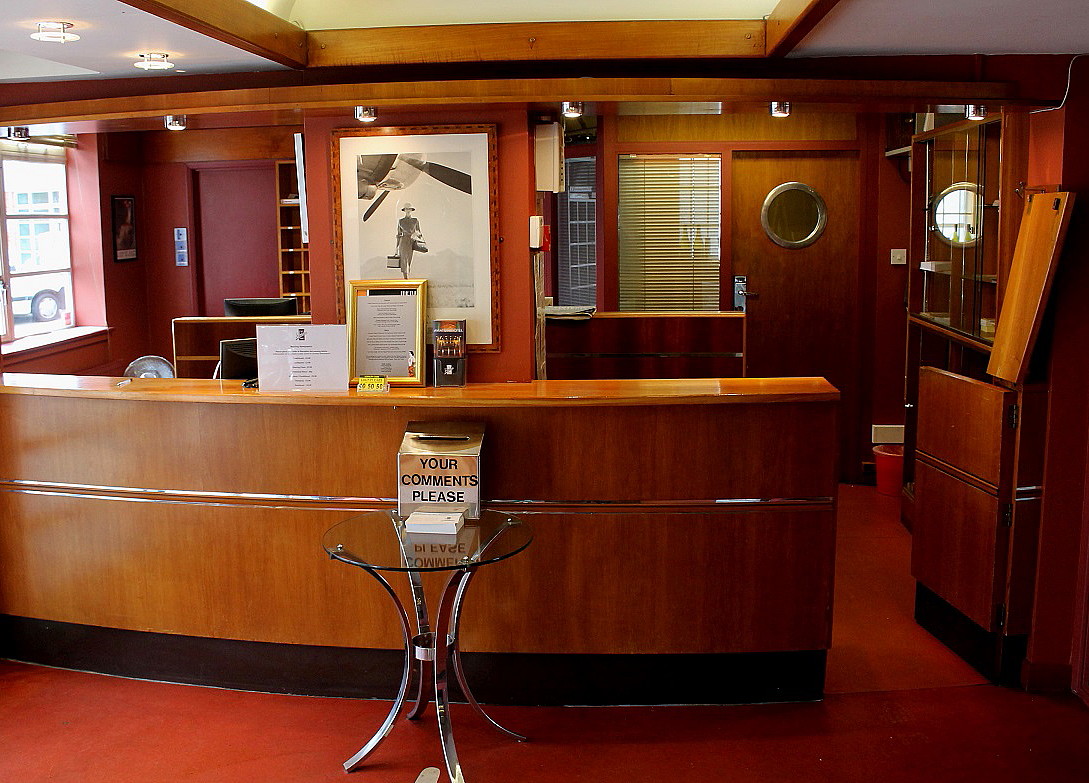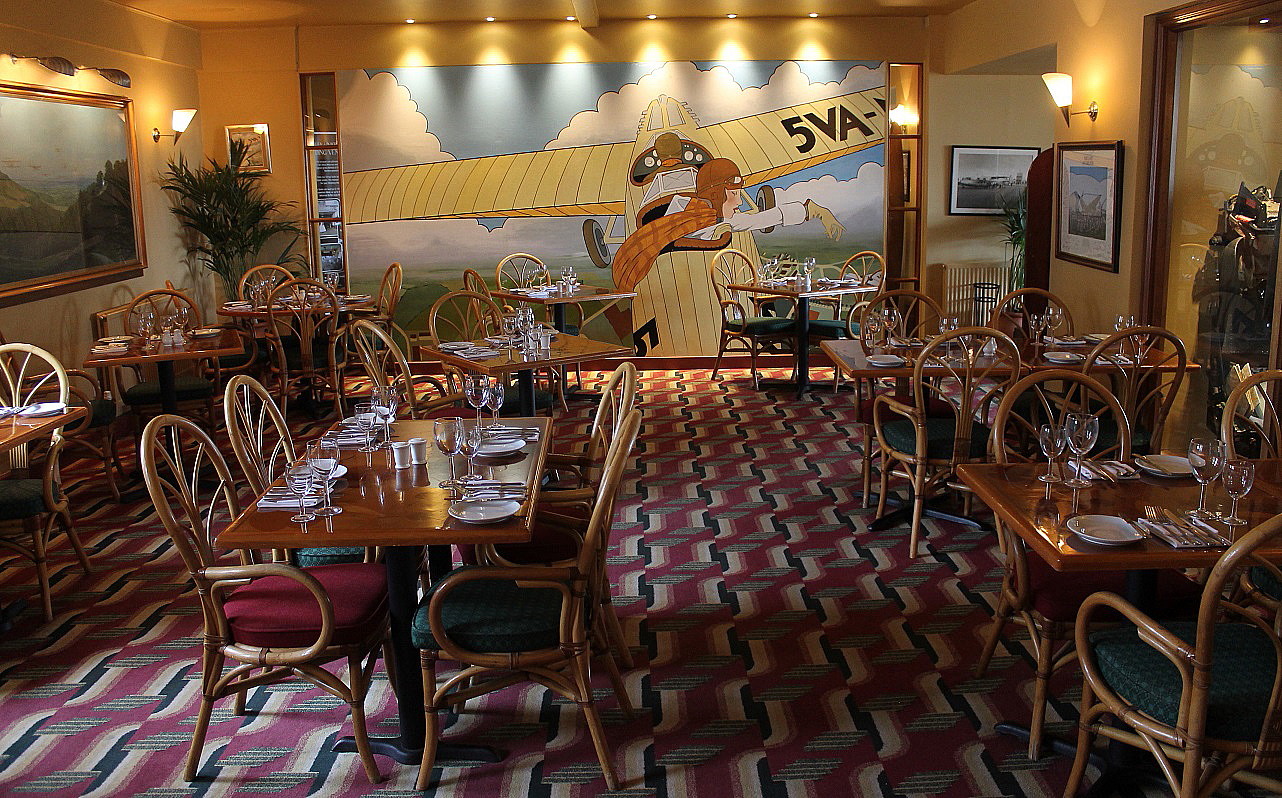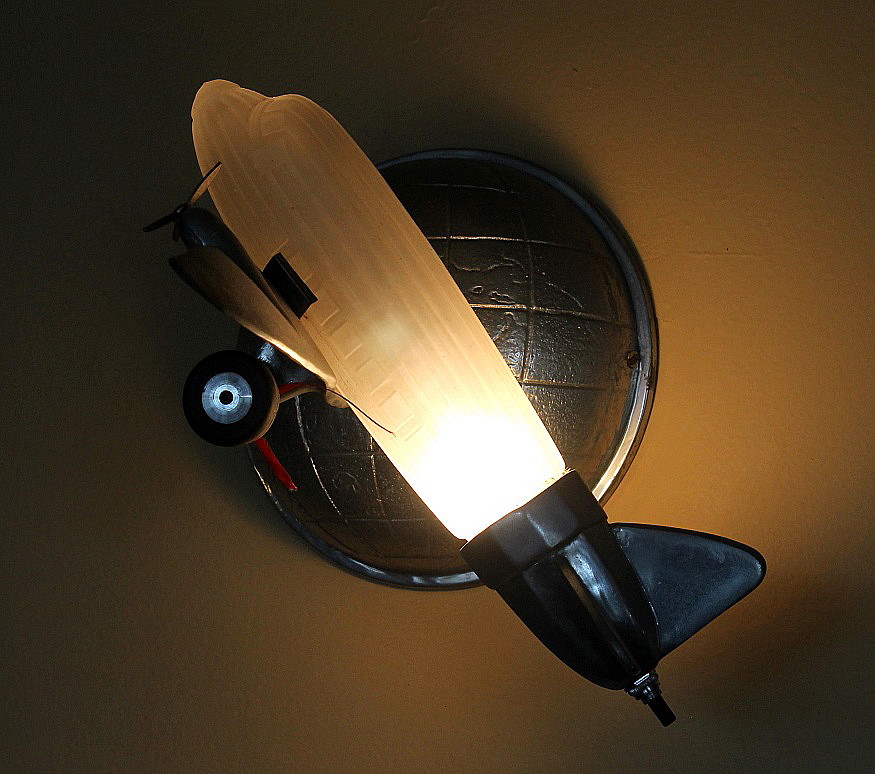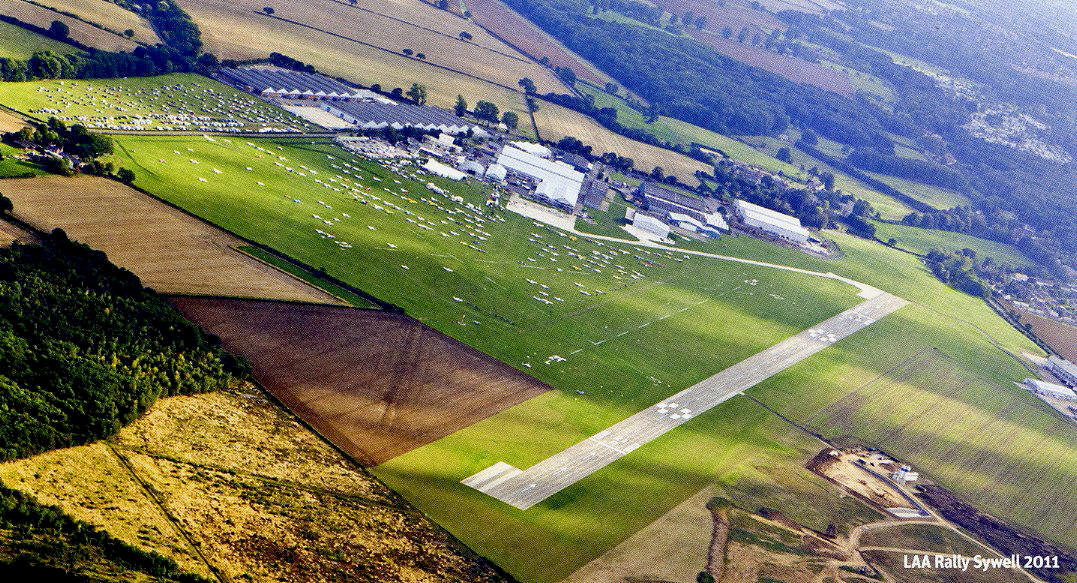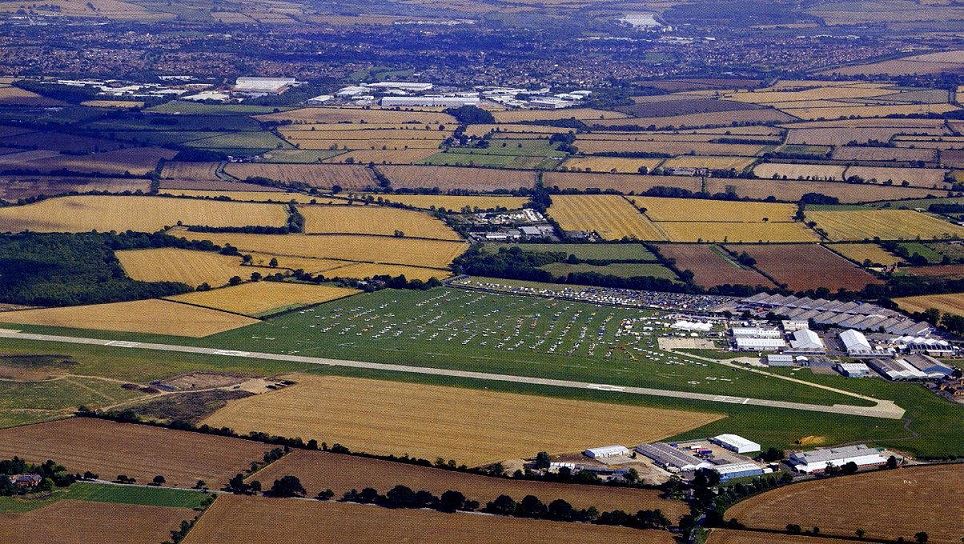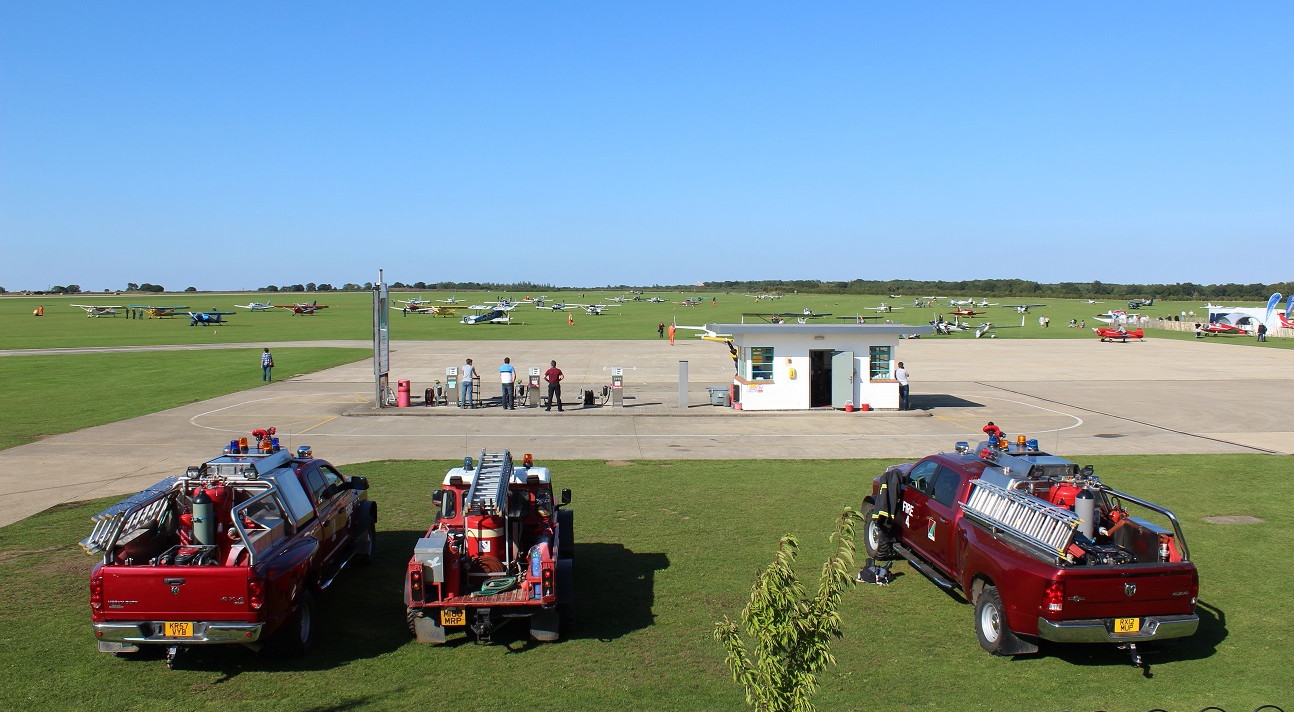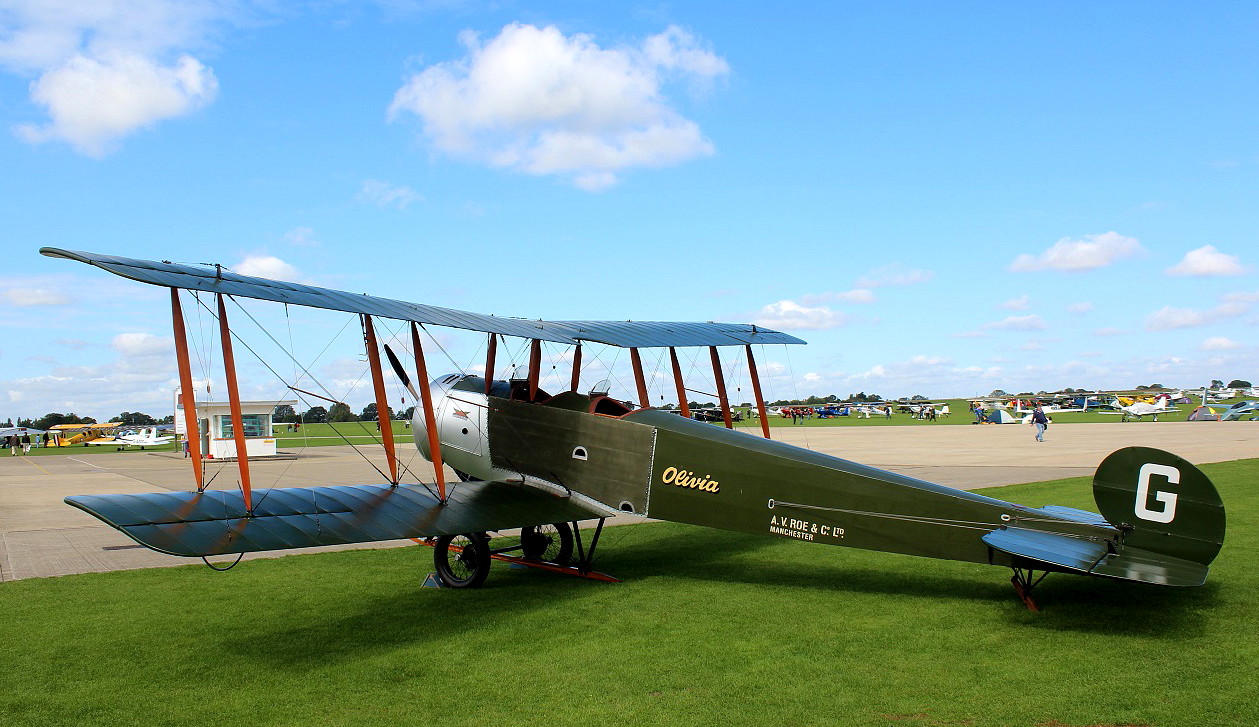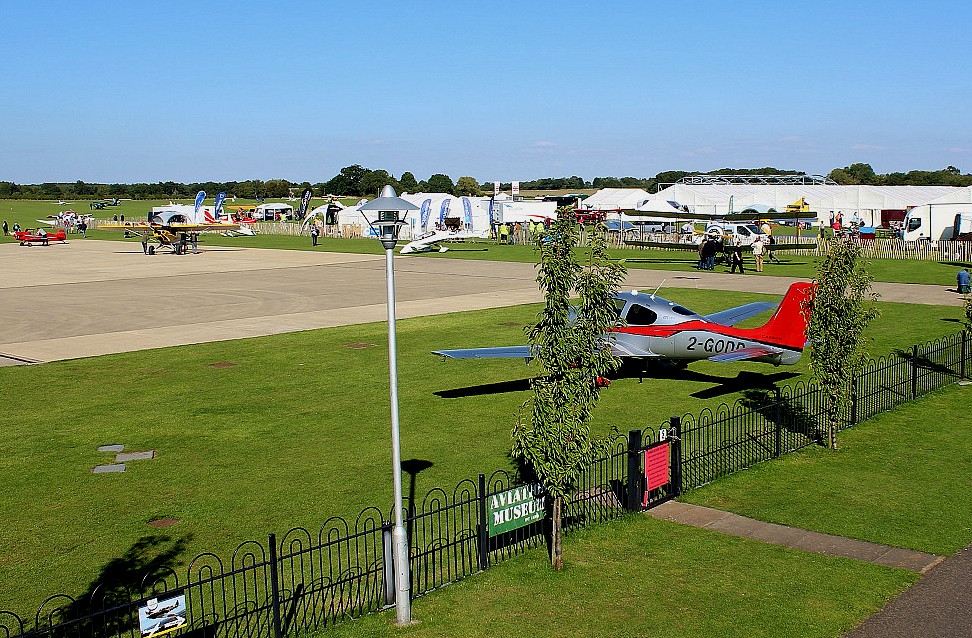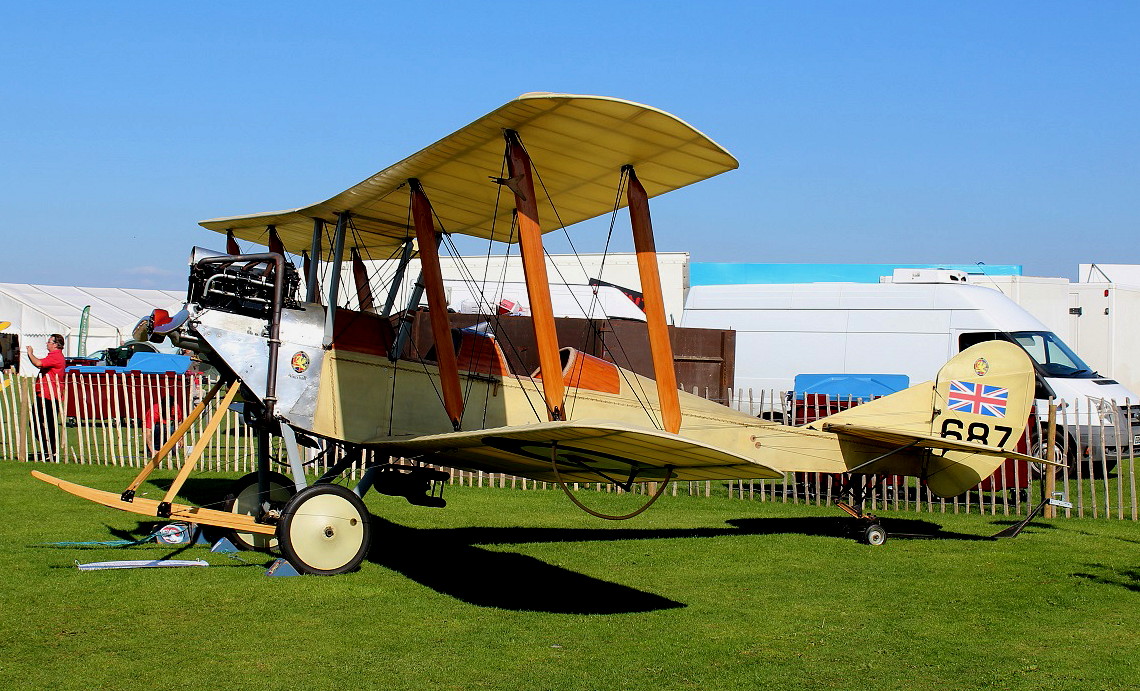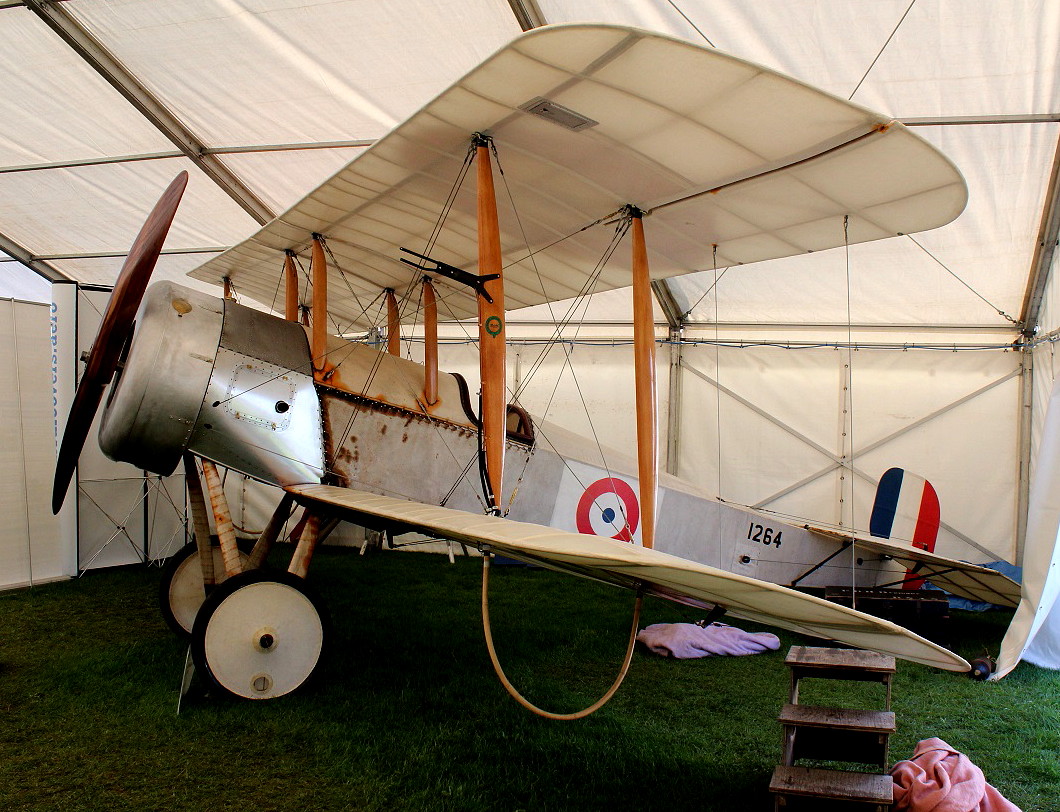Sywell
SYWELL: Civil aerodrome, military in WW2, civil airport for a short period after WW2, thereafter mainly civil aerodrome (Also known as NORTHAMPTON AIRPORT)
Note: This picture was obtained from Google Earth ©
A MICHAEL T HOLDER GALLERY
A BONUS PICTURE
Note: The second picture above, and this one, were both obtained from Flight magazine.
Note: All pictures by the author unless specified.
Military user: WW2: RAF Flying Training Command 50 Group
6 EFTS (Tiger Moths)
Operated by: From 1927?/28?/29? Northampton Aero Club
1933: Sywell Aerodrome Ltd
1950s to - : Sywell Aerodrome Ltd
Activities: Airline, charter, GA private, training and maintenance
Location: NNE of Sywell, E of A43, 6nm NE of Northampton
A MIKE CHARLTON GALLERY
Note: These pictures from postcards were kindly sent by Mike Charlton who has an amazing collection. See; www.aviationpostcard.co.uk
Notes: This first picture, and even the second picture, could easily date from the 1930s, or even the 1950s perhaps. I suspect it was demolished in the 1960s? A motel was later built but not in this position, but on the site of the Aviator Hotel we have today.
Third picture: Could this be the 6 EFTS Tiger Moth fleet in WW2?
Airline operators: Pre 1940: Crilly Airways
Post 1945: Derby Airways*
Charter, air taxi: Post 1945: Bond Air Services, Brooklands Aviation, Business Flights
Pleasure flights: Pre 1940: Brooklands Aviation
Flying club/schools: Pre 1940: Brooklands Aviation, Northamptonshire Aero Club, Northampton Working Men’s Flying Club**
Post 1945: Delta Aviation, Northamptonshire Aero Club, Northamptonshire School of Flying, (also microlight training too in 2006 at least), R.B. Flying Group
Note: In the 1957 The Aeroplane directory, Northamptonshire Aero Club are listed as operating five DH89A Tiger Moths and three Austers.
1959 ‘snapshot’: Easy King Flying Group, Northamptonshire Aero Club
Gliding: Northampton Gliding Club
Note: In the 1957 The Aeroplane directory, the Northampton Gliding Club were listed as operating here.
Helicopter ops: Sloane Helicopters
Maintenance: 2001: Taylor
Period of operation: 1927 (some say 1928) to present day. Apparently ‘officially’ opened 29th Sept 1929?
Post 1945: (Some records state this aerodrome closed in 1953 but was this just for military activities? (For military flying activity only did it really close down completely for a while?) In last five decades to the 2000s at least, very active for GA
Note: These maps are reproduced with the kind permission of Pooleys Flight Equipment Ltd. Copyright Robert Pooley 2014:
Runways: 1930s: Max landing run 1097 grass
WW2: N/S 933 grass NE/SW 978 grass E/W 1152 grass NW/SE 937 grass
1965: 03/21 1341x122 grass 16/34 1143x122 grass
1990/2000: 03/21 909x30 grass 15/33 528x18 grass 07/25 700x18 grass
(The approval for a new concrete runway was given in 2010)
2013: 03L/21R 1268 hard 03R/21L 671 grass
05/23 602 grass 15/33 450 grass
SIR ALAN COBHAM PAYS A VISIT:
Note: This article was published in the Northampton Chronicle and Echo on the 18th May 1929. SYWELL was the 6th venue on Sir Alan Cobham's 1929 Municipal Aerodrome Campaign tour, this being on the 21st May. The original plan was to visit 107 venues on mainland Britain. Mostly in England but two in Wales and seven in Scotland. After a couple of crashes and other setbacks he finally managed to visit about 95 venues - still a magnificent achievement in those days.
The aircraft he mostly used was the ten-seater de Havilland DH61 'Giant Moth' G-AAEV.
A SECOND GALLERY FROM MICHAEL T HOLDER
Note: It was Mr Michael T Holder, a great friend of this 'Guide' who discovered the advert and the article in Flight magazine which was published on the 28th September 1929.
In the summer of 1930 forty women pilots attended the first ‘All-Women’s Flying Meeting’ which was being held here.
Venue (21st September) for Alan Cobham’s 1935 No.1 Tour.
**THE NORTHAMPTON WORKING MEN'S FLYING CLUB
It seems well worth mentioning this “Working Men’s” flying club which I found a mention of in 2013. A web search seems to reveal nothing but in over ten years of research I cannot recall finding anything similar – unless the title is both misleading and overstated? I would much appreciate more information about this.
CRILLY AIRWAYS
By 1936 Crilly Airways based at BRAUNSTONE (Leicester Airport) were operating a network connecting, for example, SYWELL with Bristol (WHITCHURCH), DONCASTER, Hull (HEDON), Liverpool (SPEKE), Norwich (MOUSEHOLD HEATH) and Nottingham(TOLLERTON). A summer service branch served Skegness and on demand services went to Birmingham (CASTLE BROMWICH) and London (HESTON).
*DERBY AIRWAYS
Some sources state that Derby Aviation operated these services but this is not strictly correct as by this time the airline operation had been re-named Derby Airways. The inaugural flight to Jersey by Dakota G-APBC was on the 10th May 1958 with Capt. Milsom in command and Capt. Cramp as co-pilot. The first public service was flown on the 21st June. This was the first ‘outstation’ established by Derby Airways managed by its own staff – albeit Mrs M Bray acting on her own!
THE PFA RALLYS
The PFA Rallys were held here from 1971 to 1976 - possibly longer? Some say they started here in 1969. The Evans VP-1 G-AYXW was built in 1972 so this helps to roughly date the picture, copyright of Air Portraits, Bromsgrove, who also has their name stamped on the picture of the Taylor Monoplane G-AXYK and the third picture.
THE AVIATOR HOTEL
In more recent times I suppose the most historically important aspect regarding this location is the Aviator Hotel which has been the “totally restored” in the Art Deco style although I strongly suspect the ‘new’ airport terminal building is far better than the original building. Without any doubt a magnificent achievement and a wonder to see and visit. It would seem that the latter success of this aerodrome has been married to it being partially if not mostly a centre for industrial and commercial enterprise not connected to aviation. Visiting it in 2006 (and later) it did appear to be a ‘model’ site to illustrate just how successful this approach could be. To see how a grass aerodrome site (now with one hard runway of course) can be positively exploited to the benefit of everybody involved. I reckon SYWELL is one of the shining stars on the UK GA aerodrome scene.
AVIATOR HOTEL PICTURES
THE KING'S CUP
On the 1st July 2007 the King’s Cup Air Race was held here for the first time since the annual race started in 1922 from CROYDON (LONDON) and subsequent races were held here, (to date in 2012), in 2008, 2009, 2010 and 2011 before returning once again to SHOBDON (HEREFORDSHIRE) in 2012. The winning entrants are listed below and I would much appreciate anybody filling in the blanks to complete the record.
DATE Name of Winner Aircraft Type Registration Av. Speed
01.07.07 Neil Cooper Beagle Pup 150 G-IPUP
10.08.08 Nigel Reddish Vans RV-7 G-SEVN
Note: Nigel Reddish also won the King’s Cup at SHOBDON in 2006 flying G-SEVN and one of rare occasions that the same aircraft, (not the pilot), has been a winner in the King’s Cup.
16.08.09 Richard Marsden Vans RV-6 G-TNGO 190mph
15.08.10 Roderick Morton Slingsby T.67 Firefly G-KONG
14.08.11 Malcolm Montgomerie Cessna 152 G-BJWH 116mph
As mentioned elsewhere in this Guide the really great aspect of the King’s Cup is that it is a handicapped race so sheer speed alone does not guarantee a win. It puts the emphasis on piloting abilities and aircraft preparation. But even so what a surprise to see a Cessna 152 winning, so congratulations to Mr Montgomerie, flying a type which most look down upon. Having flown roughly thirty plus different 150s/152s in the UK, Europe, Australia and the USA I love this tough little aeroplane and consider it great fun to fly and indeed have on occasions both surprised and amused, (even delighted on one occasion flying out of Seville), instructors when throwing it around a bit or going for a spot landing on the ‘piano keys’. Being far from a ‘hot-shot’ pilot myself this little aeroplane does reward anybody prepared to respect it’s very capable abilities.
THE R.B. FLYING GROUP
In 2006 the R.B. Flying Group were offering for training and hire a Piper PA-28-140, a Cessna 172, a Robin DR.253 - and, incredible it seems to me – an Auster 5/J1. The prices for the Auster, (assuming a mistake hadn’t been made?), was remarkably cheap. £50 dual, £30 solo. Mind you, a £50 a month fee is imposed to belong to the group but, even so, I’m pretty certain they were the only commercial flying club in the UK offering an Auster in recent years for both training and flying around purposes?
Another visit in 2012 showed that the addition of a hard runway meant that business aviation could make more use of the facility.
Note: The first picture was scanned from the Light Aviation magazine. As was the second, in my opinion much better picture, taken by Ed Hicks and published in the August 2017 edition. A date isn't given but I'd guess this was later, possibly of the 2015 or 2016 Rally?
LAA RALLYS
The Light Aircraft Association had been holding their annual Rallys here. (Since 2010?) In 2012 for example 940 aircraft visited over the three days and many visitors commented that the atmosphere was redolent of the Rallys in the ‘good old days’ of the 70s and 80s. More than twenty visitors from Belgium, France, Germany, Italy, Sweden, The Republic of Ireland and The Netherlands were made especially welcome.
In the October 2013 edition of Light Aviation, the magazine states, “940 aircraft visited over the three days, up 196 on last year. Top of the table by a country mile was Van’s with 111 RVs of various models followed by 61 Jodels (including tailwheel Robins), 54 Europas, 37 PA-28s, 23 Sportcruisers, 22 Jabirus, 20 C172s and 17 Cubs. To me seeing that ‘only’ 20 C172s visited was especially interesting as I had flown a variety of 172s (and even a Cessna 152) into previous Rallies at CRANFIELD and KEMBLE. Never once did I get the slightest impression of being a second-class citizen due to arriving in a club or group ‘spamcan’ – if anything quite the opposite. The Rally is, if anything, the major celebration of private aviation in all its guises in the UK and is proud of the fact that it promotes light aviation for everybody who is enthusiastic about their flying no matter what type of machine is used.
A FEW PICS FROM THE 2015 RALLY
AN ASTONISHING QUEST
For a fuller story see the April 2015 issue of Light Aviation magazine. In effect, two brothers, David and Rick Bremner, having discovered a control stick, rudder bar and magneto when clearing out a workshop belonging to their grandfather after he died in 1983, (aged 89), led to the idea that they should build an exact replica of the Bristol Scout their grandfather had flown in WW1. And what's more, the exact type he would have flown from the Greek island of Imbros during the Gallipoli campaign. After many years, and of course many considerable problems to surmount, this aeroplane first flew from BICESTER (OXFORDSHIRE) on Thursday 10th July 2015.
MR BLETSOE-BROWN
The development of SYWELL has been mostly attritubed to Mr Bletsoe-Brown and in 2012 (at least) his personal aerial conveance was a Wilga G-WILG named The Startled Fart. A good enough name indeed I’d imagine for an aircraft type which, when full power is applied, seems to get airborne well before the laws governing aeronautics have a chance to apply themselves.
HUMAN POWERED FLIGHT
In April 2013 Light Aviation announced: “The Human Powered Flight Group of the Royal Aeronautical Society’s Icarus Cup event, planned for Sywell Aerodrome from 19 to 28 July, has been sanctioned by the Fédération Aéronautique Internationale (FAI) ….as an FAI Category 2 competition, the hope being this will lead to the first ever FAI World Championship for Human Powered Aircraft in 2014. The Icarus Cup competition seeks to challenge human powered aircraft through a number of tasks, including flight duration, a 200m sprint race, a 1km race, completion of a slalom course, a take-off performance and landing accuracy task, and distance around a triangular course.”
A note was added that the first Icarus Cup event took place at LASHAM (HAMPSHIRE) in 2012 but, “was dogged by poor weather conditions”. It seems to me quite remarkable that almost exactly one hundred years later, aircraft powered by humans are, in principal, replicating many of the tasks faced by the pioneer aviators of powered flight. Without any doubt, and probably impossible (?) is the challenge to climb out of ground effect?
PERSONAL MEMORIES
This airfield has many fond personal memories for me, and for all sorts of reasons. Not least because SYWELL was second destination whilst conducting my first cross-county flight when learning to fly, landing here in the Cessna 152 G-WACB, (which I had first soloed in), on the 20th June 1989. I still remember climbing up to the tower to get my paper signed and really hoping so much that I had made a good job of the arrival. Thankfully they signed me off.
This picture shows me delivering the Mudry CAP-10B N5020W, which I had collected from SPILSTEAD FARM in SUSSEX the previous afternoon.
Heather Kennedy
This comment was written on: 2018-05-05 00:00:19Hi there, Every now and then I have a quick google of my Grandads old Taylor Monoplane that he built and this time I was very surprised to find a anew picture that I hadn’t seen before! So, my Grandfather is Cyril Oakins and he is leaning into the Taylor Monoplane (G-AXYK) with my Mum behind him in the white jumper. He never did get over selling it back in the 80’s after 7 years labour of love to build it in their old pre-fab...you couldn’t make it up! Thank you for sharing this picture...we have hundreds as you can imagine but it’s lovely all the same given the selection you must have had to choose from! Thanks Heather
We'd love to hear from you, so please scroll down to leave a comment!
Leave a comment ...
Copyright (c) UK Airfield Guide














